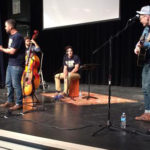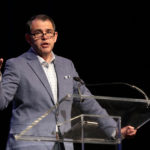INDIANAPOLIS—A host of speakers in rain-drenched Indianapolis called for God to “rain down” revival upon America during the 2008 Pastor’s Conference, held prior to the Southern Baptist Convention annual meeting.
Rallying around the theme, “Prepare for Rain,” speakers began by urging pastors to renew their commitment to prayer and get their own spiritual lives in order. Tom Elliff used an analogy from the Oklahoma land rush to describe what can happen even to pastors who fail to address sin in their own lives.
In Oklahoma, Sooners looked across the land and thought “instant farm” as they anticipated the rush to stake their claims to the land, Elliff said. But they discovered ground, matted down with prairie grass, so hard it had to be broken up with an ax.
Like Oklahoma sod, the hearts of pastors can be marked by hardness, become impervious to God’s word, show stubborn resistance, be unfruitful and remain asleep through every season, Elliff warned.
“A heart like fallow ground will take a lot of effort,” he said. “What’s God going to have to do to get our attention?”
Nothing short of deliberate, diligent attention can affect that kind of change, he said.
Reversing decline
Johnny Hunt, senior pastor of First Baptist Church, Woodstock, Ga., noted 90 percent of Southern Baptist Convention churches are in decline.
Hunt, who later was elected SBC president, cited research that suggested 50 percent of SBC churches existing today will have padlocks on their doors by 2030. His own church had declined two years before Hunt took six weeks off for reading and renewal last year, he said.
Sign up for our weekly edition and get all our headlines in your inbox on Thursdays
During his time off, Hunt said God repeated three things to him over and over again: “No. 1, you need to go back and pray more aggressively. “No. 2, he challenged me to witness more intentionally. I wrote down three names in the front of my Bible” who needed to be won to Christ.
“I flat went after them!” he said. “No. 3, God challenged me to lead not only by exhortation…but we are to lead by emulation,” Hunt said. “I’ve got not only to tell them, I’ve got to show them.
“You know what happened? We increased by 15 percent in Bible study, increased by 15 percent in worship,” he said. “There’s only one thing worse than our convention being on a slide, and that is that we don’t give a holy rip. … We don’t need a better strategy; we need a touch from God.”
Daniel Simmons, senior pastor of Mt. Zion Baptist Church in Albany, Ga., reminded pastors that God and prayer are the keys to revival.
“Only God can bring revival,” Simmons said. When revival doesn’t come, “the shortage must not be in God; it must be in us.”
Broken vessels
God calls and uses broken people for his service, other speakers stressed.
Brokenness is “the recognition of our shattered pride without a need to glue it back together again,” said Ed Litton, senior pastor of First Baptist Church of North Mobile, in Saraland, Ala. Litton described losing his wife 10 months ago in a car accident.
“In that instant, my life changed and I began a journey to a place I did not care to go,” he said.
When God leads his servants to such a place, he forces them to face their deepest fear, Litton said.
But God restores them in ways they cannot imagine to prepare them for significant ministry, he said, preaching from Psalm 23.
“Some of you are facing the worst fear of your life. And some of you are on the verge of the greatest movement of God in the history of your life, your ministry and your church,” he said. “God doesn’t call complete, fully contained, self-actualized people who have it together. He calls the broken.”
George Harris, senior pastor of First Baptist Church in Kerrville, Texas, said brokenness isn’t sought or caught. Instead, it’s “a process that God takes us through in order to get us to hear him,” he said.
Hayes Wicker, senior pastor of First Baptist Church, Naples, Fla., added that brokenness does not come without a struggle.
“God wrestles with us to bring blessedness from brokenness,” he said, preaching from Genesis 32:24–31 and describing Jacob’s struggle with God.
More than wounded
Alan Day, senior pastor of Edmond’s First Baptist Church, Edmond, Okla., said it is important that being wounded not be mistaken for brokenness.
“Most of us have been through breaking, but I don’t know if most of us have been through (being) broken,” said Day, who dealt with some health issues that caused him to lean totally on God in order to pull himself out of depression and discouragement.
“God’s pattern is breaking the man of God, the preacher, before that man of God can ever be fruitful,” Day said, noting that brokenness is essential for real intimacy with God, for hearing God and for leading God’s people.
“God wants to do something in your church. He is only going to do it when pastors become broken men and allow God to fill us with himself.”
Surprise welcome from coach
Conference participants had an unexpected visit from Tony Dungy, coach of the Indianapolis Colts of the National Football Leauge, and author of the book, Quiet Strength.
Dungy welcomed his fellow Southern Baptists to the city. He shared how God has opened doors for him to speak to numerous groups since winning the Super Bowl as a coach two years ago and writing a book.
“I realize many of our young people are really, really searching for something. For the most part they are finding those things that are not fulfilling,” the coach observed. “They are still searching for what we know is fulfilling and that is that relationship with Jesus Christ.”
He challenged Baptists to continue to deliver the message of Jesus Christ in different ways. “We are all on the same team. We’re going to work for the Lord and Christ will honor what you do.”
Need for revival
Several speakers issued a call to revival. But Jimmy Draper, president emeritus of LifeWay Christian Resources in Nashville, Tenn., admitted the topic of revival is very hard for him. “We have not seen revival so I know very little about it.”
Draper observed there is a lack of passion for Christ in churches today. “Complacency surrounds our services. Deadness prevails. There is no fire in the altar. Our churches flounder in apathy while the world plunges deeper into sin.”
The former SBC president noted that despite better training and resources, Southern Baptists baptized fewer people last year (346,000) than they did in 1950 (376,000) when the convention had only 6 million members. Southern Baptists are reaching fewer people for Christ because “we don’t see the world through the eyes of Jesus who died for them. We don’t win the lost because we don’t like them.”
Draper noted there is no explanation for genuine revival. “Revival comes from God and leads to God,” he said. Revival is a great movement of God “that cannot be explained by anything that we do. It is an extraordinary movement of the Holy Spirit.”
Conditions are right for revival, Draper observed, citing the evil, spiritual decline, and apathy in the churches that are found today. “It is in times like these that God sends revival,” Draper said.
Southern Baptist evangelist Bill Stafford of Chattanooga, Tenn., observed: “We need a revival of getting back to the word of God. Let is speak for itself. God doesn’t need our help.”
Christians are called to march against the world, he observed. “We are to be lighthouses marching against the darkness, but it must be upon the basis of the inerrant word of God.”
Call for repentance
James McDonald, senior pastor of Harvest Bible Church in Rolling Meadows, Ill., observed that the key to revival is repentance.
“Repentance is the funnel through which revival flows,” McDonald said.
Charles Lowery, Kerry Shook and Jay Strack challenged pastors to use their unique styles and personalities.
Lowery, president and CEO of Lowery Institute for Excellence in Lindale, Texas, used Psalm 100 to administer “group therapy” to the crowd. Using the word “last” as his outline, he challenged the pastors to Laugh, be Authentic, Serve with gladness, and Tell themselves everyday what is really important.
Asking the crowd to repeat after him, he led them in the following confession: “I, being of sound mind, do hereby acknowledge that I have not, nor have I ever, nor will I ever, control the universe.
Therefore, I resign as general manager of the universe.”
Shook senior pastor of Fellowship of the Woodlands, Woodland, Texas, challenged his fellow pastors to ask the clarifying question: “What would I do if I had one month to live?” Using Christ’s life as an example, he shared four principles—live passionately, love completely, learn humbly and leave a bold legacy.
Need for mentors
Strack, president of the Jay Strack Association, Orlando, Fla., drew from several biblical examples beginning with Exodus 17 to emphasize the need for great leaders to mentor the next generation. “Success without successors is not success.”
During the business session of the Pastor’s Conference, Ed Litton, senior pastor of First Baptist North Mobile in Mobile, Ala., was elected president, succeeding Michael Catt, senior pastor of Sherwood Baptist Church, Albany, Ga.
Other officers include Bruce Schmidt, pastor of Lamar Baptist Church in Arlington, Texas, vice president, and James Peoples, pastor of Trinity Baptist Church in Keystone Heights, Fla., secretary-treasurer.
Contributing to this report were Bill Webb, Word and Way (Missouri); Jennifer Rash and Grace Thornton, The Alabama Baptist; and Jim White, Religious Herald (Virginia).














We seek to connect God’s story and God’s people around the world. To learn more about God’s story, click here.
Send comments and feedback to Eric Black, our editor. For comments to be published, please specify “letter to the editor.” Maximum length for publication is 300 words.